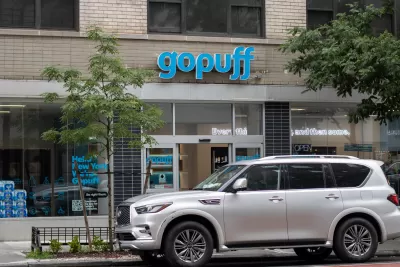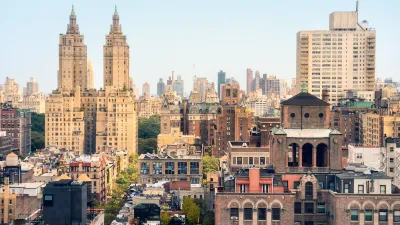Criticized as ‘dark stores,’ the warehouses for quick-delivery services have been popping up around the city.

The “rapid grocery delivery hubs” that have been appearing around New York City could be legalized under Mayor Adams’ zoning reform proposal, reports Nick Garber in Crain’s New York Business. Operated by businesses that promise ultra-fast grocery delivery, usually under 15 minutes, the hubs were criticized for operating as warehouses in what would otherwise be public-facing storefronts, not accepting cash payment, and threatening to take business from local bodegas.
“Since last year, the hubs have been governed by a bulletin issued by the Department of Buildings, which clarified that they could stay open in commercial districts rather than being relegated to industrial zones—so long as they stayed within a certain footprint, allowed the public to enter and kept their windows transparent.” The new zoning plan, dubbed the City of Yes for Economic Opportunity plan, would codify those rules citywide and add requirements such as clear windows in areas with high pedestrian traffic.
However, the entire issue could be moot, with many of the delivery companies already out of business. “Following the initial boom, the number of grocery delivery hubs has shrunk around the city, with multiple companies including Buyk, Jokr and Fridge No More shutting down their operations.”
According to Garber, “Other components of the administration’s Economic Opportunity plan would put casinos in line with the zoning code ahead of their expected approval in the city, allow small shops to open up in residential areas, and remove decades-old restrictions on dancing and live music.”
FULL STORY: Rapid grocery delivery hubs get green light to stay put under Adams' zoning plan

Maui's Vacation Rental Debate Turns Ugly
Verbal attacks, misinformation campaigns and fistfights plague a high-stakes debate to convert thousands of vacation rentals into long-term housing.

Planetizen Federal Action Tracker
A weekly monitor of how Trump’s orders and actions are impacting planners and planning in America.

San Francisco Suspends Traffic Calming Amidst Record Deaths
Citing “a challenging fiscal landscape,” the city will cease the program on the heels of 42 traffic deaths, including 24 pedestrians.

Defunct Pittsburgh Power Plant to Become Residential Tower
A decommissioned steam heat plant will be redeveloped into almost 100 affordable housing units.

Trump Prompts Restructuring of Transportation Research Board in “Unprecedented Overreach”
The TRB has eliminated more than half of its committees including those focused on climate, equity, and cities.

Amtrak Rolls Out New Orleans to Alabama “Mardi Gras” Train
The new service will operate morning and evening departures between Mobile and New Orleans.
Urban Design for Planners 1: Software Tools
This six-course series explores essential urban design concepts using open source software and equips planners with the tools they need to participate fully in the urban design process.
Planning for Universal Design
Learn the tools for implementing Universal Design in planning regulations.
Heyer Gruel & Associates PA
JM Goldson LLC
Custer County Colorado
City of Camden Redevelopment Agency
City of Astoria
Transportation Research & Education Center (TREC) at Portland State University
Jefferson Parish Government
Camden Redevelopment Agency
City of Claremont





























